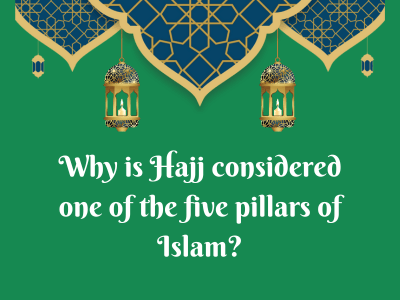Ever wondered about the significance of Hajj in Islam? It’s a special piece in the Muslim puzzle and one of the Five Pillars, a big deal in Islam. Join us in a simple and fun exploration of the world of Hajj and its importance in Islam.
The Five Pillars of Islam: A Quick Guide
Explore the key actions that Muslims do to express their belief in Islam – these are called the Five Pillars. These acts, from declaring faith in one God to going on a special journey called Hajj, are like a guide for Muslims to live in line with their faith.
Historical Significance of the Five Pillars
The Five Pillars have been foundational principles guiding Muslims through history, shaping cultural, social, and ethical dimensions. The Shahada unifies diverse Muslim communities, Salah maintains spiritual connection, Zakat addresses inequalities, Sawm reflects shared commitment, and Hajj brings Muslims worldwide together, fostering unity and brotherhood.
Hajj: A Spiritual Renewal Journey
Hajj is a special soul journey for Muslims, beyond a physical trip. Pilgrims, dressed in simple clothes, symbolize unity. The rituals, like circling the Kaaba, are moments of reflection, repentance, and connection to the divine. Despite its challenges, Hajj is a reset button for hearts, renewing a sense of humility and faith.
The Role of Hajj in Personal Transformation
Hajj is a transformative journey, changing how people act and think. It’s not just about the place; it’s about becoming a better person. Special rituals, like circling the Kaaba, encourage growth, making it a journey to patience and kindness. Hajj is a chance to be a better version, to seek forgiveness, and return home renewed and closer to God.
Hajj as a Symbol of Equality and Brotherhood
Hajj symbolizes equality and a global Muslim family. Pilgrims, regardless of wealth, wear simple clothes, emphasizing unity in faith. Rituals, like circling the Kaaba, strengthen the bond among Muslims. It’s a giant family reunion, reminding that, in God’s eyes, everyone is equal.
Spiritual Benefits of Performing Hajj
Performing Hajj is a special journey bringing spiritual benefits. It’s a deep connection with God, with rituals like circling the Kaaba creating a sense of divine closeness. Hajj is a recharge, renewing faith and leaving a refreshed feeling inside. The journey is a chance for forgiveness, letting go of mistakes, and returning home spiritually strengthened.
Hajj’s Impact on Global Muslim Identity
Hajj unites Muslims globally, creating a sense of a global family. Standing together in Mecca is like a big family reunion, reinforcing equality. This shared experience strengthens the bond among Muslims, emphasizing a united community connected by faith.
Conclusion: Hajj and Islam’s Essence
In simple terms, Hajj epitomizes Islam’s core values, expressing faith, togetherness, and personal growth. The rituals, like circling the Kaaba, encourage treating each other equally. Hajj brings Muslims from different places, showing their connection through faith, a meaningful part of being a Muslim.
FAQs About Hajj
- Is Hajj obligatory for all Muslims?
- Yes, Hajj is mandatory for financially and physically able Muslims.
- What is the significance of the Kaaba in Hajj?
- The Kaaba symbolizes the unity of Muslims and serves as the focal point of Hajj rituals.
- How long does the Hajj pilgrimage last?
- The main rituals occur over five days, but the entire journey may take a few weeks.
- Can someone perform Hajj on behalf of another person?
- Yes, a person can perform Hajj on behalf of someone unable to undertake the journey.
- What is the spiritual meaning behind Tawaf?
- Tawaf represents the ceaseless devotion of Muslims to the one true God.
- Are there variations in Hajj rituals among different Muslim sects?
- While the core rituals remain the same, some variations exist in specific practices among different sects.

